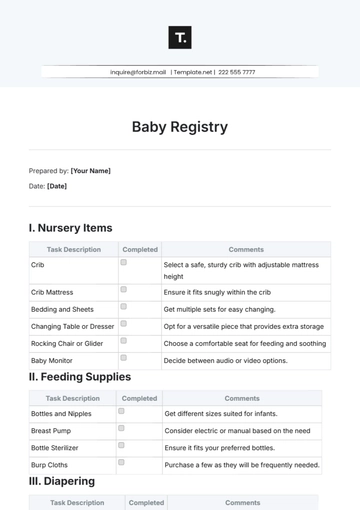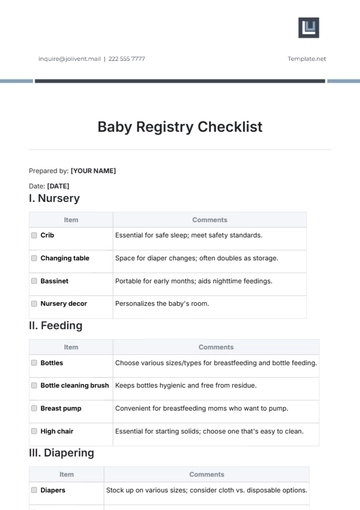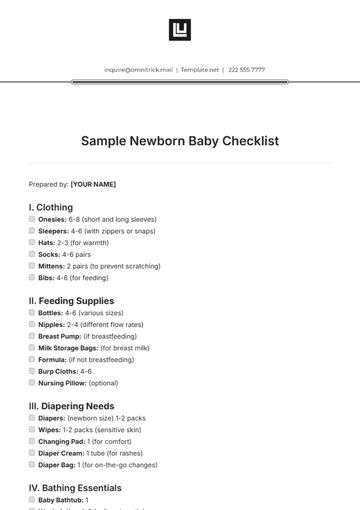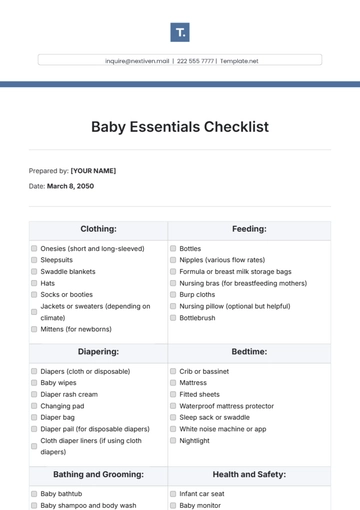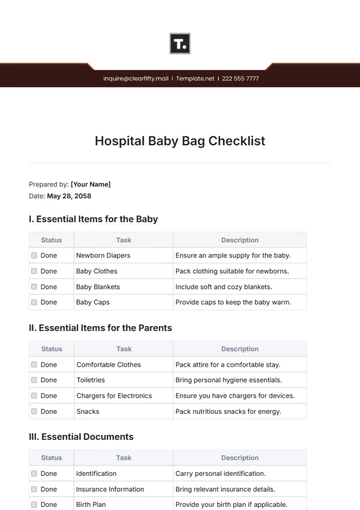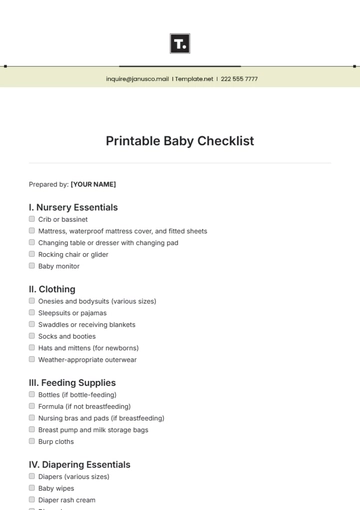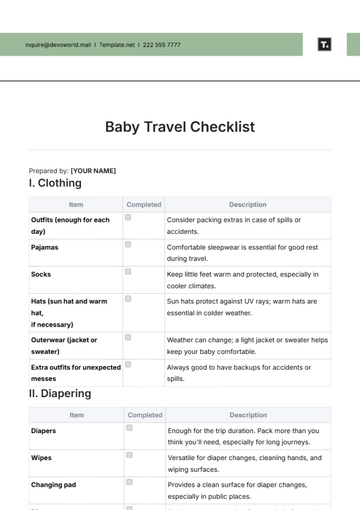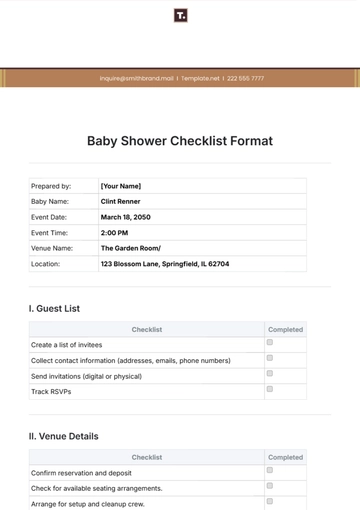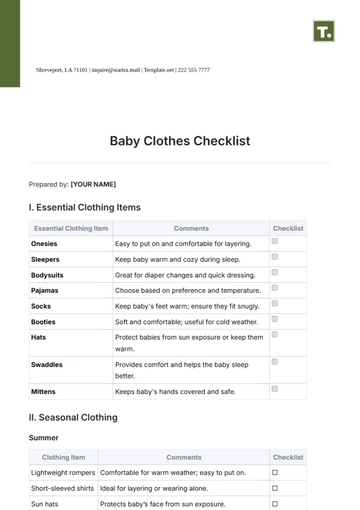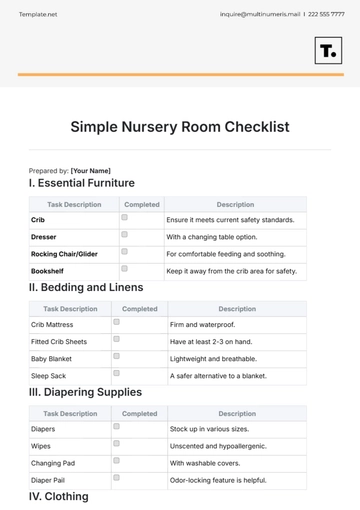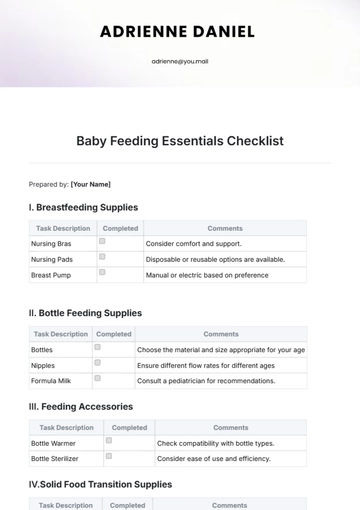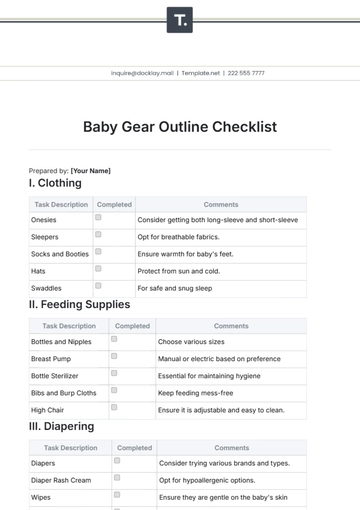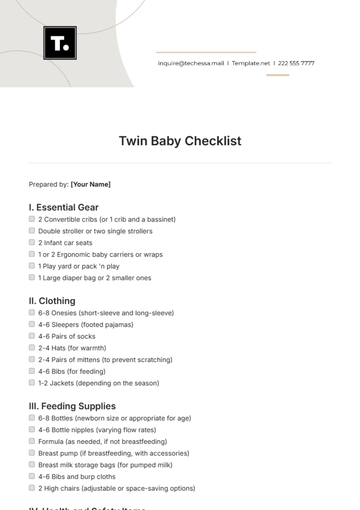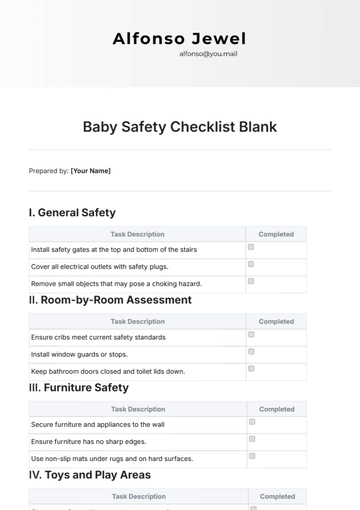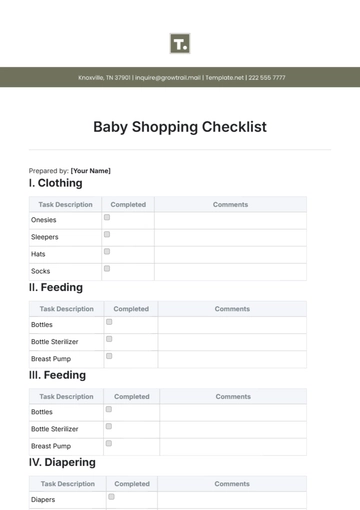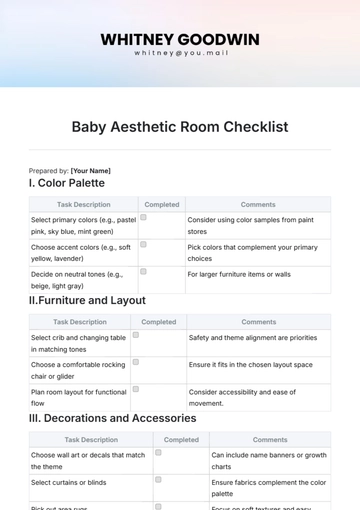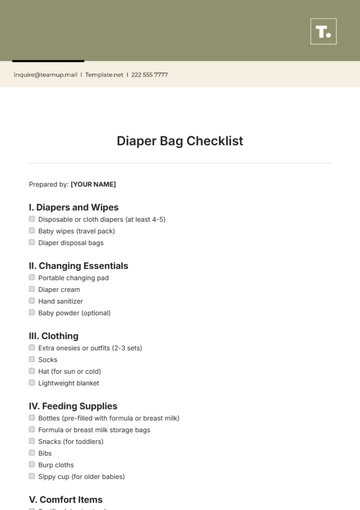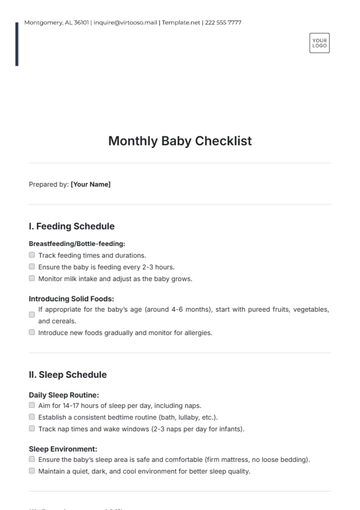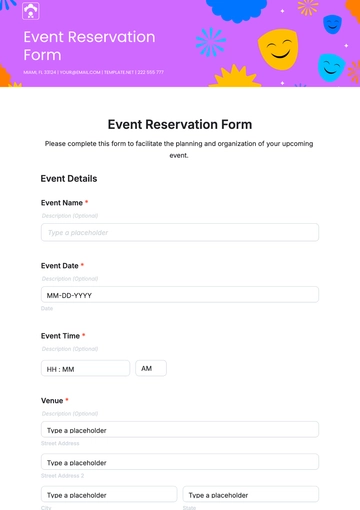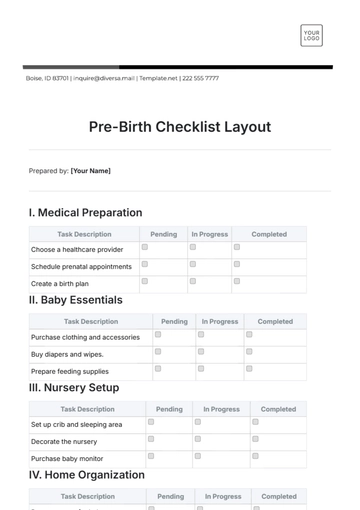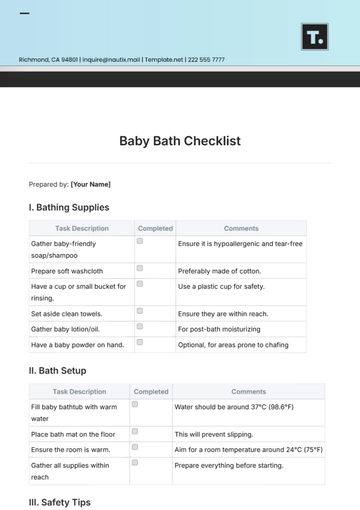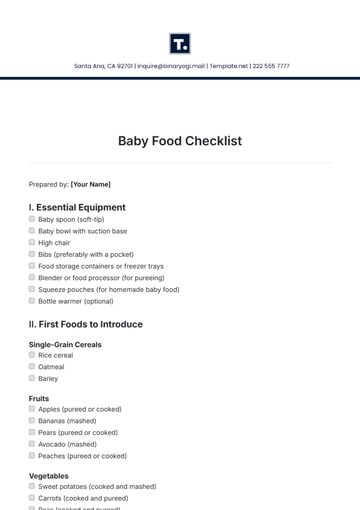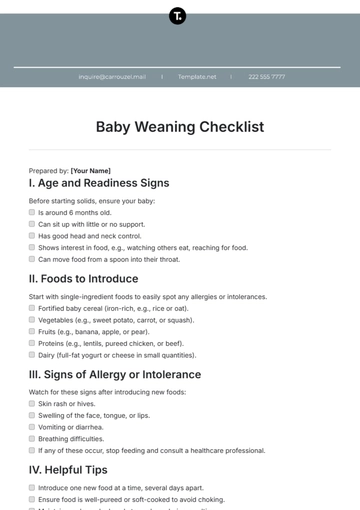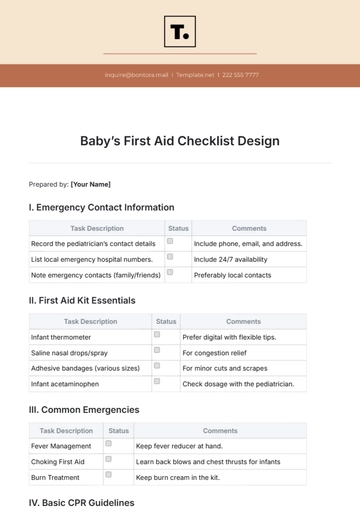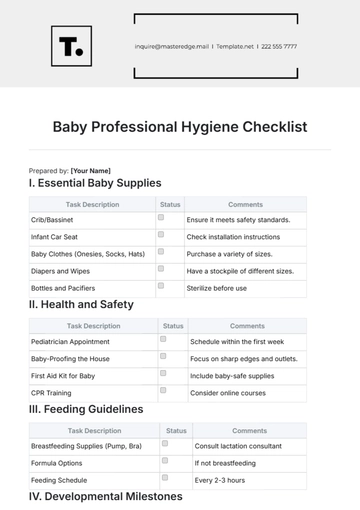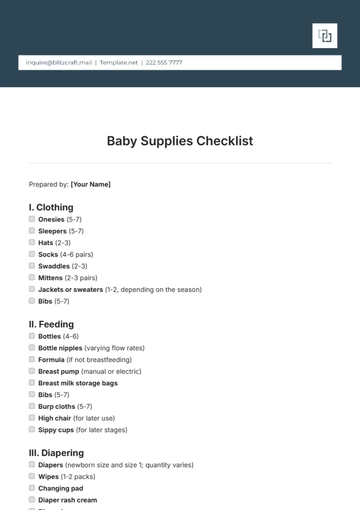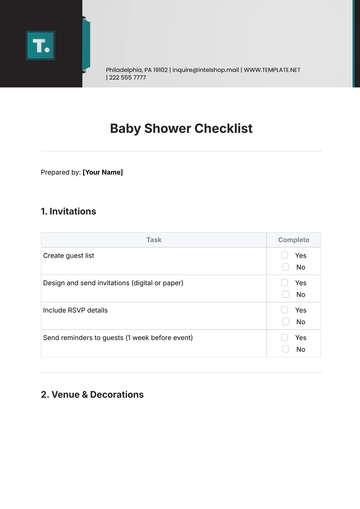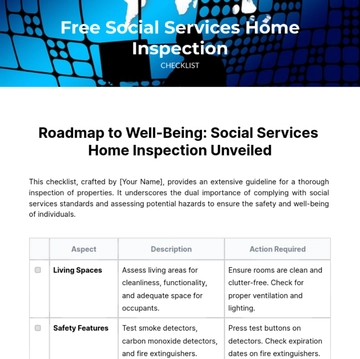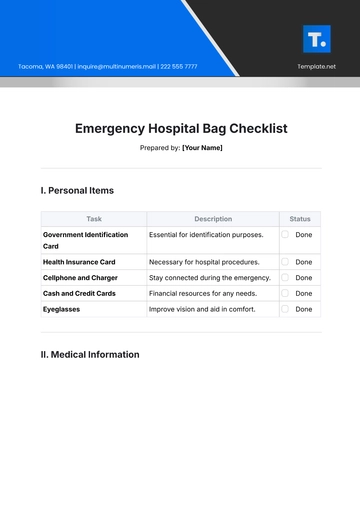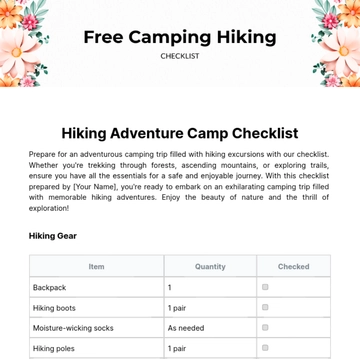Free Monthly Baby Checklist
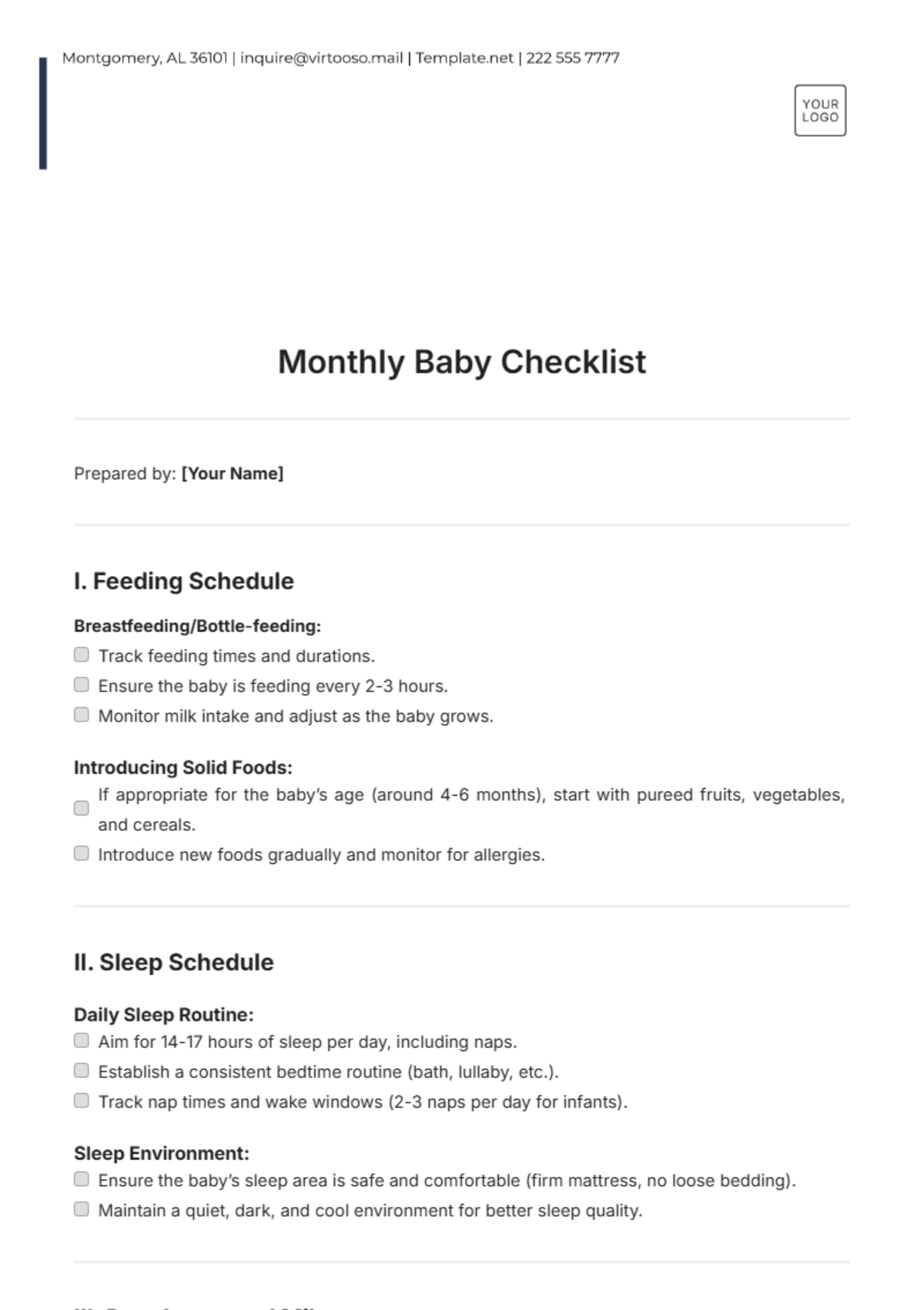
Prepared by: [Your Name]
I. Feeding Schedule
Breastfeeding/Bottle-feeding:
Track feeding times and durations.
Ensure the baby is feeding every 2-3 hours.
Monitor milk intake and adjust as the baby grows.
Introducing Solid Foods:
If appropriate for the baby’s age (around 4-6 months), start with pureed fruits, vegetables, and cereals.
Introduce new foods gradually and monitor for allergies.
II. Sleep Schedule
Daily Sleep Routine:
Aim for 14-17 hours of sleep per day, including naps.
Establish a consistent bedtime routine (bath, lullaby, etc.).
Track nap times and wake windows (2-3 naps per day for infants).
Sleep Environment:
Ensure the baby’s sleep area is safe and comfortable (firm mattress, no loose bedding).
Maintain a quiet, dark, and cool environment for better sleep quality.
III. Developmental Milestones
Physical Development:
Encourage tummy time for motor skill development.
Watch for signs of rolling over, sitting up, or crawling.
Cognitive & Social Development:
Engage with toys, colors, and sounds to stimulate learning.
Observe the baby’s responses to faces, voices, and new environments.
Encourage bonding with cuddles, talking, and eye contact.
IV. Health Checkups
Doctor Visits:
Schedule regular pediatric checkups.
Ensure the baby receives vaccinations on time.
Monitor weight, height, and head circumference during each visit.
Health Monitoring:
Watch for signs of illness (fever, coughing, irritability).
Check for rashes, diaper rash, and teething symptoms.
V. Baby Supplies
Clothing:
Ensure the baby’s clothes are the right size (check monthly).
Stock up on seasonal clothing (e.g., warmer clothes for colder months).
Diapers & Hygiene:
Keep track of diaper supplies (aim for 8-10 changes per day).
Have baby wipes, rash cream, and bathing products ready.
Toys & Equipment:
Rotate age-appropriate toys to stimulate development.
Check baby gear for safety (crib, car seat, stroller).
VI. Self-care for Parents
Rest:
Ensure you get enough sleep and rest, especially when the baby is napping.
Support:
Don’t hesitate to ask for help from family or friends.
Take time for relaxation or hobbies when possible to recharge.
Health:
Schedule regular checkups for yourself.
Maintain a balanced diet and hydration to stay healthy.
- 100% Customizable, free editor
- Access 1 Million+ Templates, photo’s & graphics
- Download or share as a template
- Click and replace photos, graphics, text, backgrounds
- Resize, crop, AI write & more
- Access advanced editor
Stay organized month by month with our Monthly Baby Checklist Template from Template.net. This customizable and editable template helps you track your baby’s needs and milestones. Modify the checklist using our intuitive Ai Editor Tool to suit your baby’s growth and development. Keep up with all the essentials and milestones throughout each month.
You may also like
- Cleaning Checklist
- Daily Checklist
- Travel Checklist
- Self Care Checklist
- Risk Assessment Checklist
- Onboarding Checklist
- Quality Checklist
- Compliance Checklist
- Audit Checklist
- Registry Checklist
- HR Checklist
- Restaurant Checklist
- Checklist Layout
- Creative Checklist
- Sales Checklist
- Construction Checklist
- Task Checklist
- Professional Checklist
- Hotel Checklist
- Employee Checklist
- Moving Checklist
- Marketing Checklist
- Accounting Checklist
- Camping Checklist
- Packing Checklist
- Real Estate Checklist
- Cleaning Checklist Service
- New Employee Checklist
- Food Checklist
- Home Inspection Checklist
- Advertising Checklist
- Event Checklist
- SEO Checklist
- Assessment Checklist
- Inspection Checklist
- Baby Registry Checklist
- Induction Checklist
- Employee Training Checklist
- Medical Checklist
- Safety Checklist
- Site Checklist
- Job Checklist
- Service Checklist
- Nanny Checklist
- Building Checklist
- Work Checklist
- Office Checklist
- Training Checklist
- Website Checklist
- IT and Software Checklist
- Performance Checklist
- Project Checklist
- Startup Checklist
- Education Checklist
- Home Checklist
- School Checklist
- Maintenance Checklist
- Planning Checklist
- Manager Checklist
- Wedding Checklist
- Vehicle Checklist
- Travel Agency Checklist
- Vehicle Inspection Checklist
- Interior Design Checklist
- Backpacking Checklist
- Business Checklist
- Legal Checklist
- Nursing Home Checklist
- Weekly Checklist
- Recruitment Checklist
- Salon Checklist
- Baby Checklist
- Equipment Checklist
- Trade Show Checklist
- Party Checklist
- Hospital Bag Checklist
- Evaluation Checklist
- Agency Checklist
- First Apartment Checklist
- Hiring Checklist
- Opening Checklist
- Small Business Checklist
- Rental Checklist
- College Dorm Checklist
- New Puppy Checklist
- University Checklist
- Building Maintenance Checklist
- Work From Home Checklist
- Student Checklist
- Application Checklist
